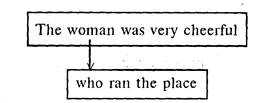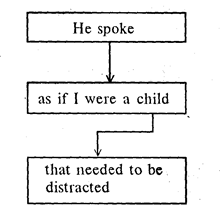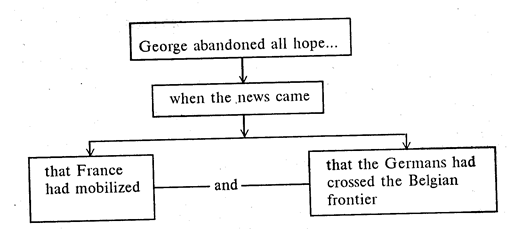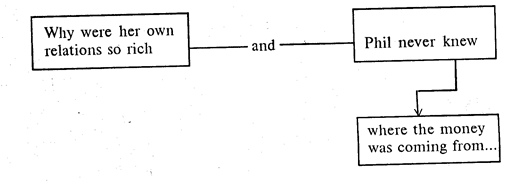
РЕЗОЛЮЦІЯ: Громадського обговорення навчальної програми статевого виховання
ЧОМУ ФОНД ОЛЕНИ ПІНЧУК І МОЗ УКРАЇНИ ПРОПАГУЮТЬ "СЕКСУАЛЬНІ УРОКИ"
ЕКЗИСТЕНЦІЙНО-ПСИХОЛОГІЧНІ ОСНОВИ ПОРУШЕННЯ СТАТЕВОЇ ІДЕНТИЧНОСТІ ПІДЛІТКІВ
Батьківський, громадянський рух в Україні закликає МОН зупинити тотальну сексуалізацію дітей і підлітків
Відкрите звернення Міністру освіти й науки України - Гриневич Лілії Михайлівні
Представництво українського жіноцтва в ООН: низький рівень культури спілкування в соціальних мережах
Гендерна антидискримінаційна експертиза може зробити нас моральними рабами
ЛІВИЙ МАРКСИЗМ У НОВИХ ПІДРУЧНИКАХ ДЛЯ ШКОЛЯРІВ
ВІДКРИТА ЗАЯВА на підтримку позиції Ганни Турчинової та права кожної людини на свободу думки, світогляду та вираження поглядів
- Гідрологія і Гідрометрія
- Господарське право
- Економіка будівництва
- Економіка природокористування
- Економічна теорія
- Земельне право
- Історія України
- Кримінально виконавче право
- Медична радіологія
- Методи аналізу
- Міжнародне приватне право
- Міжнародний маркетинг
- Основи екології
- Предмет Політологія
- Соціальне страхування
- Технічні засоби організації дорожнього руху
- Товарознавство продовольчих товарів
Тлумачний словник
Авто
Автоматизація
Архітектура
Астрономія
Аудит
Біологія
Будівництво
Бухгалтерія
Винахідництво
Виробництво
Військова справа
Генетика
Географія
Геологія
Господарство
Держава
Дім
Екологія
Економетрика
Економіка
Електроніка
Журналістика та ЗМІ
Зв'язок
Іноземні мови
Інформатика
Історія
Комп'ютери
Креслення
Кулінарія
Культура
Лексикологія
Література
Логіка
Маркетинг
Математика
Машинобудування
Медицина
Менеджмент
Метали і Зварювання
Механіка
Мистецтво
Музика
Населення
Освіта
Охорона безпеки життя
Охорона Праці
Педагогіка
Політика
Право
Програмування
Промисловість
Психологія
Радіо
Регилия
Соціологія
Спорт
Стандартизація
Технології
Торгівля
Туризм
Фізика
Фізіологія
Філософія
Фінанси
Хімія
Юриспунденкция
SUGGESTED WAYS OF SENTENCE ANALYSIS
I. The simple sentence
1. Dusk - of a summer night.
It is a simple extended one-member declarative sentence.
Dusk is the main (principal) part of this sentence. It is expressed by a common noun in the common case.
of a summer night is an attribute to the main part. It is expressed by a prepositional phrase.
2. Stop talking!
It is an imperative exclamatory sentence.
Stop talking is the predicate. It is a compound phasal verbal predicate. It consists of two parts. The first
part is expressed by the phasal verb stop in the imperative mood. It denotes the end of the action.
The second part is expressed by a non-perfect gerund active denoting the action itself.
3. Could’ve been professional.
It is a simple unextended two-member elliptical declarative sentence. The position of the subject is not filled with a word form.
Could’ve been professional is the predicate. It is a mixed type of predicate.
Could is the modal part expressed by the verb can in the subjunctive mood. It denotes a possibility
referring to the past.
have been is a link-verb expressed by a perfect infinitive. It is a link-verb of being.
professional is a predicative expressed by an adjective in the positive degree.
4. Old Jolyon watching from his corner saw his brother’s face change.
It is a simple, extended, two-member sentence.
Jolyon is the subject expressed by a proper noun in the common case.
Old is an attribute to the subject. It is expressed by an adjective in the positive degree.
watching from his corner is an attribute to the subject (or an adverbial modifier of time) expressed by a
participial phrase with participle I as headword.
saw is the predicate. It is a simple verbal predicate expressed by the verb to see in the past indefinite
active.
his brother’s face change is a complex object expressed by an objective with the infinitive construction; it
consists of a nominal phrase (his brother’s face) and a non-perfect infinitive.
Note:
Verbal and non-verbal complexes are to be treated as one indivisible part of the sentence.
5. Is the weather not likely to change?
It is a simple unextended two-member interrogative sentence.
the weather is the subject expressed by a common noun. in the common case.
Is not likely to change is the predicate. It is a compound verbal predicate of double orientation. It consists
of two parts.
Is not likely is the first part. It denotes the estimate of the speaker of, or his attitude to, the situation
described in the sentence. It is expressed by a phrase with a modal meaning.
to change is the second part. It denotes the action itself and is expressed by a non-perfect infinitive.
6. The whole house being made of wood, it looked good.
It is a simple extended two-member declarative sentence.
it is the subject expressed by a personal pronoun of the 3rd person singular.
looked good is the predicate. It is a compound nominal predicate, consisting of a link verb and a
predicative.
looked is a link verb expressed by the past indefinite of the link verb to look, which is a link verb of being
in a state.
the whole house being made of wood is an adverbial modifier of reason expressed by a nominative
absolute participial construction.
7. I found my life dull.
It is a simple extended two-member declarative sentence.
I is the subject expressed by a personal pronoun of the 1st person singular.
found is a simple verbal predicate expressed by the past indefinite of the verb to find.
my life dull is a predicative complex (or a complex object) expressed by an objective non-verbal
construction (or by an object + objective predicative).
II. The composite sentence
A. The compound sentence
1. (a) Coffee was served and the ladies went upstairs.
It is a compound sentence consisting of two coordinate clauses connected by copulative connection with the help of the conjunction and.
| Coffee was served | and | The ladies went upstairs |
(b) He loved his work and he counted himself fortunate to have such an opportunity so early in his
career.
It is a compound sentence containing two clauses joined by causative-consecutive relations with the help of the copulative conjunction and, which expresses a shade of consecutive relations.
(c) I wanted to go on, whereas my friend wanted to go back.
It is a compound sentence comprising two coordinate clauses which are connected by adversative connection expressed by the adversative conjunction whereas.
In sentences (b), (c) the graphical presentation is the same asin sentence (a).
2. (a) Our Elsie was looking at her with big imploring eyes; she was frowning, she wanted to go.
It is a compound sentence consisting of three coordinate clauses which are connected by copulative coordination asyndetically.
| Our Elsie was looking... | she was frowning | she wanted to go | ||
(b) I longed to stay there and tell the truth, but that would have been ridiculous, so I came away.
It is a compound sentence comprising three coordinate clauses. The first two clauses are joined by means of adversative connection with the help of the adversative conjunction but. The second and the third clauses are connected by causative-consecutive connection with the help of the consecutive conjunction so.
| I longed to stay there... | ——but— | that would have been ridiculous | —so—— | I came away |
B. The complex sentence
1. (a) What impressed me was Cyprus Avenue.
It is a complex sentence with the subject expressed by a subordinate clause introduced by the conjunctive pronoun what. The main clause is devoid of the subject.
 What impressed me What impressed me
| ← | was Cyprus Avenue |
(b) This is where Havoc Has been.
It is a complex sentence with a predicative clause introduced by the conjunctive adverb where. The main clause is devoid of the predicative.
| This is | → | where Havoc has been |
(c) What surprised him was that there was no pain about it.
It is a complex sentence with a subject and a predicative clause. The subject clause is introduced by the conjunctive pronoun what and the predicative clause by the conjunction that. Since these clauses occupy the positions of the main parts of the sentence, the main (principal) clause is reduced to the link verb only.
| What surprised him | ← | was | → | that there was no pain about it |
2. (a) The woman who ran the place was very cheerful.
It is a complex sentence comprising (or consisting of) two clauses. The main clause is The woman was very cheerful. The subordinate clause is who ran the place. It is a restrictive (limiting) relative attributive clause modifying the subject of the main clause as its antecedent.

The same graphical presentation is to be found in other complex sentences containing one subordinate clause.
(b) The next book she wrote she sent to a magazine.
It is a complex sentence with a contact clause dependent on the antecedent the next book, which is the subject of the main clause.
Or:
It is a complex sentence containing a restrictive attributive clause joined to the main clause asyndetically.
(c) Stratford-on-Avon, -where Shakespeare was born, is visited by thousands of tourists.
It is a complex sentence with a descriptive (or non-restrictive) attributive clause introduced by the relative adverb where, which refers to the antecedent Stratford-on-Avon in the main clause.
(d) Look before you leap.
It is a complex sentence with an adverbial clause of time introduced by the conjunction before and depending on-the predicate of the main clause.
(e) Bad as things are, we mustn’t give up hope.
It is a complex sentence with an adverbial clause of concession. The concessive clause is introduced by the conjunction as with inverted word order in the subordinate clause. It modifies the whole of the main clause.
3. I did not tell Muriel on my return to London what George had said to me, or what he looked like, but contended myself with assuring her that he was well and happy.
It is a complex sentence comprising one main clause and three subordinate object clauses. The main clause contains two homogeneous predicates (did not tell and contended) connected by the conjunction but. The first and the second subordinate clauses are homogeneous, they are joined to each other by the disjunctive conjunction or and introduced by the conjunctive pronoun what. Both modify the first of the two homogeneous predicates. The third object clause is introduced by the conjunction that. It depends on the object to the second homogeneous predicate with assuring.

(а) Не spoke as if I were a child that needed to be distracted.
It is a complex sentence comprising three clauses. (Or: it is a complex sentence consisting of the main clause He spoke and two subordinate clauses of different degrees of subordination.) The first subordinate clause is of the first degree of subordination. It is an adverbial clause of comparison introduced by the conjunction as if and depending on the predicate of the main clause. The second subordinate clause is of the second degree of subordination. It is a restrictive attributive clause introduced by the relative pronoun that and depending on the predicative of the previous clause, that is, the clause of the first degree of subordination.

(b) When the news came that France had mobilized and that the Germans had crossed the Belgian frontier, George abandoned all hope immediately.
It is a complex sentence consisting of one principal and three subordinate clauses. The first subordinate clause is introduced by the conjunction when and is a subordinate clause of time of the first degree of subordination. The other two clauses are of the second degree of subordination. They are homogeneous appositive clauses introduced by the conjunction that and linked with each other by the copulative conjunction and. They both depend on the subject of the adverbial clause of time.

С. The compound-complex sentence
Why were her own relations so rich, and Phil never knew where the money was coming from for tomorrow’s tobacco?
It is a compound-complex sentence consisting of two coordinated clauses connected by contrasting relations and linked by the copulative conjunction and. Besides two coordinate clauses the sentence comprises one subordinate clause which depends on the second coordinate clause. It is an object clause introduced by the conjunctive adverb where.

Переглядів: 358